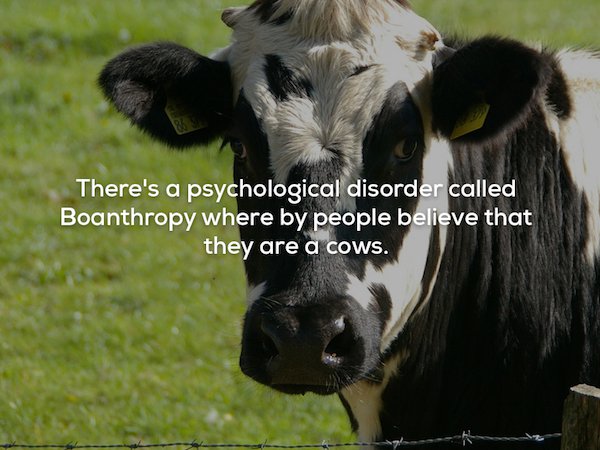Boanthropy is a psychological disorder in which humans are convinced they re cows

Boanthropy: When Humans Identify as Cows

Boanthropy, a rare psychological disorder, is characterized by individuals firmly believing that they are cows. Derived from the Greek words “boas” meaning cow and “anthropos” meaning human, Boanthropy can lead to a radical transformation in the affected person’s behavior. Although it may sound perplexing, this condition highlights how the human mind can sometimes perceive and interpret reality in unique and unexpected ways.
Understanding Boanthropy is crucial for mental health professionals, researchers, and society as a whole. In this article, we will delve into the intriguing world of Boanthropy, exploring its symptoms, possible causes, historical instances, and available treatments.
Symptoms of Boanthropy

Individuals experiencing Boanthropy genuinely believe they are cows and often exhibit behaviors associated with bovine species. While these symptoms may vary from person to person, common manifestations include:
- Mooing and imitating bovine sounds: Those affected by Boanthropy might communicate through cow-like vocalizations, faithfully imitating the characteristic “moo” sound.
- Browsing and grazing: Individuals may engage in simulated grazing activities, mimicking the eating habits of cows by “browsing” on grass or plant material.
- Walking on all fours: Some people with Boanthropy may adopt a quadrupedal gait, imitating the locomotion of cows.
- Developing fine body hair: In certain cases, individuals may grow an increased amount of body hair, resembling the fur of a cow.
- Avoiding human contact: Those with Boanthropy may feel uncomfortable or dissociated in human company, preferring to spend time with cows or other animals instead.
Causes of Boanthropy
The precise causes of Boanthropy remain unclear, as research on this disorder is limited. However, several factors may contribute to its development, including:
- Psychological and emotional experiences: Boanthropy often emerges as a result of underlying psychological or emotional distress. Trauma, stress, or a major life event might trigger the manifestation of this condition.
- Delusional disorder: Boanthropy can be classified as a specific delusional disorder, wherein an individual maintains a fixed false belief despite evidence to the contrary. This disorder causes a profound shift in one’s perception of self-identity.
Historical Cases of Boanthropy
Boanthropy is not a new phenomenon, with accounts of this condition dating back centuries. One famous historical case involves King Nebuchadnezzar II, a prominent figure in the Bible’s Book of Daniel. According to biblical narratives, the mighty king was inflicted with Boanthropy as a form of divine punishment. Nebuchadnezzar endured seven years of living in the wilderness, behaving and eating like a beast until he regained his sanity.
Treatment Options
While Boanthropy is an extraordinary condition, treatment approaches primarily revolve around addressing the underlying psychological factors contributing to the disorder. Proper diagnosis by mental health professionals is essential to ensure accurate treatment. Therapeutic interventions may include:
- Psychotherapy: Talk therapy sessions can help individuals explore and understand the root causes of their fixed beliefs. Cognitive-behavioral therapy (CBT) approaches may aid in challenging and reframing delusions associated with Boanthropy.
- Medication: In some cases, medication may be prescribed to manage any underlying mental health conditions that are exacerbating Boanthropy symptoms. This could include antipsychotic medications to alleviate delusional thinking.
It is important to note that treatment plans may vary depending on the individual’s specific circumstances and response to interventions.
Sources
This article references the following source:
Share
Table Of Contents
Related Posts
Quick Links
Legal Stuff

